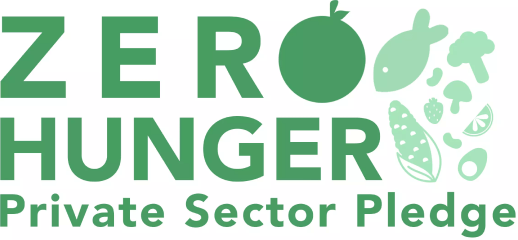
Start-ups & SMEs in Africa signal their commitment to end hunger
The Zero Hunger Private Sector Pledge is pleased to announce that four companies have committed over USD 15 million for new business projects to end hunger in Africa. All four companies are African-based and will support innovative work in Egypt, Ghana, and Nigeria.
“It is very exciting to see the uptick in engagement by companies in Africa. These companies are vibrant start-ups that are integrating innovative business models and new technologies to help end hunger in their local communities. These new pledging companies also include a first project targeting Egypt,” states Carin Smaller, Executive Director of the Shamba Centre who leads the Pledge coordination team.
The Zero Hunger Private Sector Pledge, which launched at the United Nations Food System Summit in 2021, has now mobilized nearly USD 575 million from 50 companies towards achieving SDG 2 (Zero Hunger) in 48 countries. It will publish its first accountability report by the end of the year to verify that commitments have been converted into real investments.
Welcoming new pledges
The four companies that have committed to the Zero Hunger Private Sector Pledge are: Ophir Gold in Ghana, Something Lite and Soilless Farm Lab in Nigeria, and Zr3i in Egypt.
Ophir Gold aggregates eggs from smallholder poultry farmers to derive premium egg products such as liquid eggs, egg whites, yolk pulp, and dried egg products for industrial and professional use. As CEO Gloria-Ethel Ofei-Akoto notes, “The poultry value chain employs over 5 million people in Ghana, of which 57% of them are women living in rural areas. We want to reach out to them and this is why we are pledging.”
As part of its commitment to the Pledge, Ophir Gold will invest in training, innovation in sustainable practices and extension services. This will include training for farmers on how to increase the quality and quantity of their yield using sustainable farming practices, setting up an egg processing facility focused on research & development and quality assurance, and procuring equipment to develop nutritional supplements based on dried eggs for small children suffering from malnutrition in Ghana.
Soilless Farm Lab is a technology-driven business based in Nigeria that offers soilless farming to maximize year-round crop production. It uses hydroponics and aquaponics to grow crops, in addition to deploying artificial intelligence for enhanced precision solutions.
Soilless Farm Lab encourages farming by youth and women. As part of its commitment to the Pledge, Soilless Farm Lab will support sustainable farming practices as well as the adoption of climate resilient crops through investment in two projects that focus on encouraging youth entrepreneurship in agriculture.
Something Lite produces healthy snacks with ingredients that it sources from smallholder farmers in Nigeria. At its launch in 2018, Something Lite worked with two farmers; its supply chain has since grown to 100 farmers, of which 60% are women.
As notes their CEO Janefrances Ighosewe, “Many African countries struggle with extreme poverty as there is a lack of government and community support systems for families living below the minimum wage. Because women disproportionately suffer the most from this situation, they are at the core of our work as we believe that empowering more women is critical to reduce hunger and poverty in Africa.” Something Lite will offer integrated vocational training for rural youth and contribute to social protection services through the Invest in the People Programme (IITPP).
Zr3i is an agri-tech start-up based in Egypt that uses technology with the aim of disrupting agriculture in the region. It is one of ten start-ups invited to participate in an agri-tech accelerator funded by Germany’s agency for development cooperation (GIZ).
As part of its commitment to the Zero Hunger Pledge, Zr3i will invest in three innovative programmes with partners such as the UNDP and Misr Insurance. Projects include the development of carbon sequestration using date palm trees in the Siwa oasis, which will support smallholder farmers; crop management and monitoring solutions using satellite imagery, remote sensing, artificial intelligence, and data modelling; and risk mitigation services in partnership with Misr Insurance to facilitate crop insurance for farmers.
Pledge commitments
The Pledge recognizes the important role of the private sector in contributing to food security and nutrition for all. It calls on companies to align their business investments with high-impact solutions for the sustainable eradication of hunger.
Concretely, the initiative requires companies to pledge investments targeting 90 priority countries with interventions that can help marginalized populations and small producers benefit through training and resources (empower the excluded), encourage sustainable practices that are economically viable (on the farm) and reduce post-harvest losses (food on the move).
